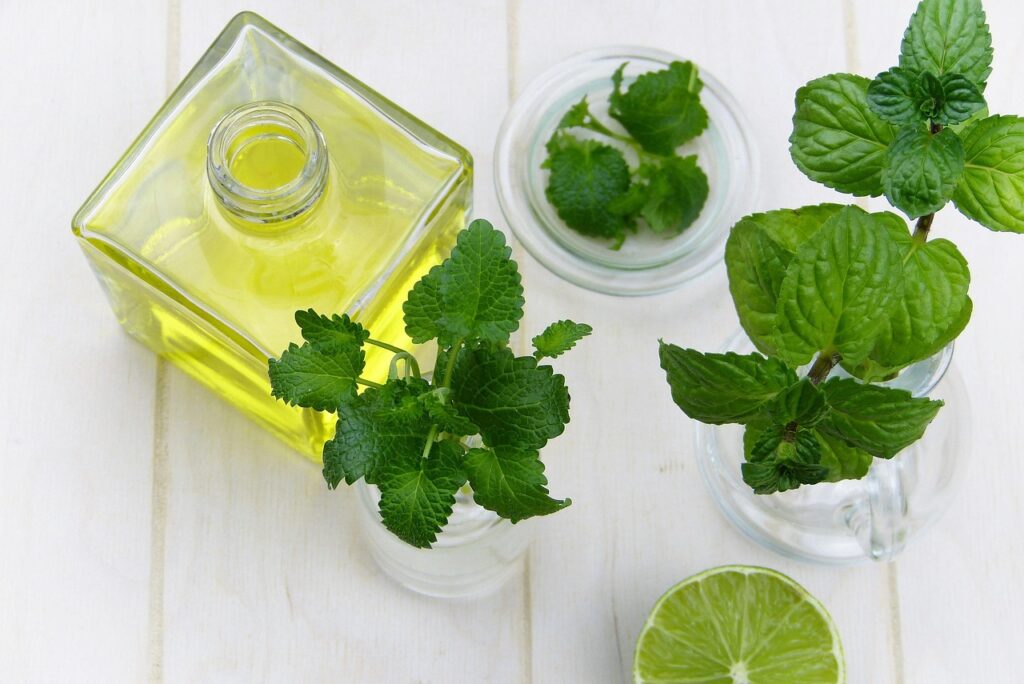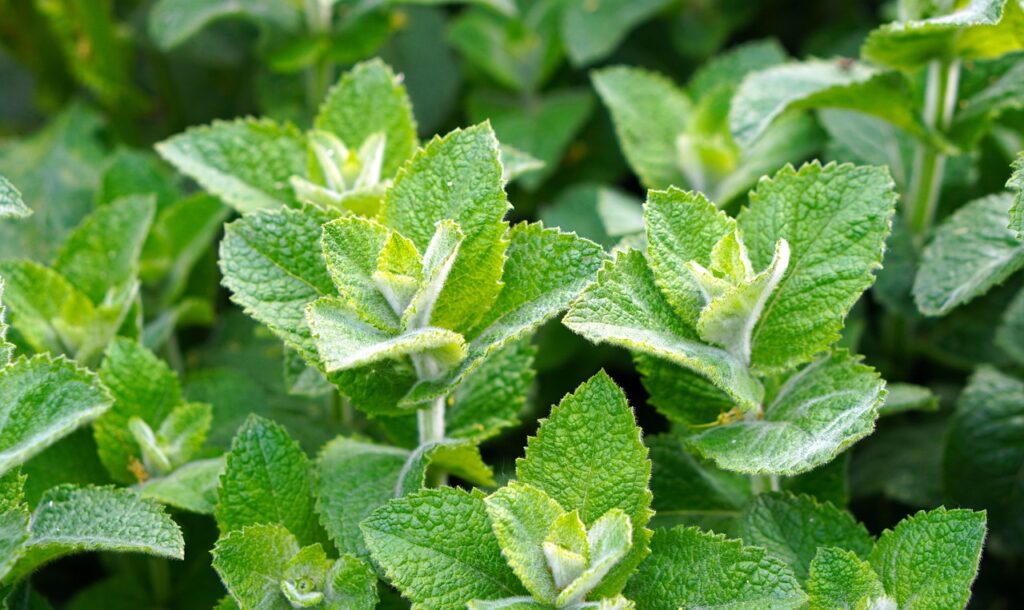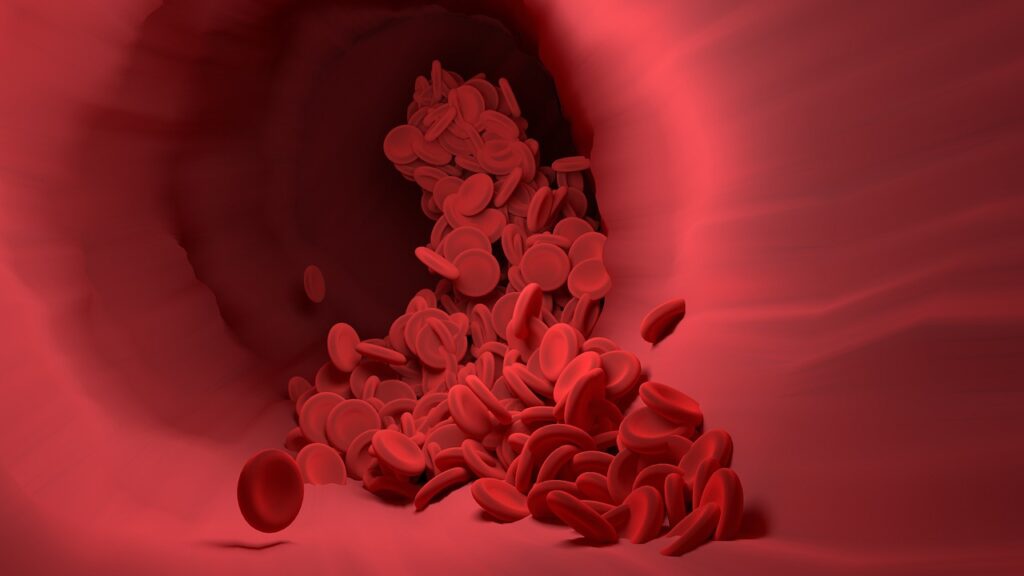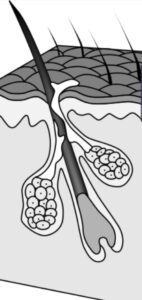
As we determine the use of peppermint oil. It’s fitting to mention that peppermint oil was first listed in the London herbal Pharmacopoeia as early as 1721. However, documentation does exist that indicates peppermint was used by the Ancient Egyptians over 1600 years prior.
Peppermint oil was first described, in journals, in 1753 from specimens that had been collected throughout England. Carl Linnaeus believed the Peppermint shrub fell within its species. The more commonly held modern belief is that it’s a hybrid.

Botanical in Nature
Mentha Arvensis is the botanical name for Peppermint. A perennial plant that grows well in many instances on land that provides a fertile soil structure. At 30-90cms (12-35in) in height it really “packs a punch” not only in the garden but also around the home. Peppermint growing in the garden will attract beneficial insects whilst acting as a deterrent for pests such as fleas, mosquitoes, and mice.
Just the mere fact that peppermint oil occurs naturally makes it universally accessible and renewable. If we don’t have any in the garden, yet, we will find that it’s inexpensive to purchase. “Is natural is good” so let’s consider why you may want some peppermint oil in the cupboard.
From nature to the cupboard
Peppermint oil, or tea, is useful, in numerous ways, in any household cupboard. Ever had one of the kids, or yourself, with a cold for example that required purchasing a decongestant from the store? Well, look no further than the cupboard for peppermint oil is a terrific decongestant for it relaxes and reduces inflammation in the lung walls with its anti-inflammatory properties. Whilst on the subject of lung benefits. Peppermint oil has been scientifically proven to eliminate the bacteria associated with staphylococcus and pneumonia.
Now get this little testimony. I’ve been a mild, to moderate, asthmatic all my life. Can tell you that I use peppermint oil now, specifically, to treat the symptoms of my asthma. No more Ventolin or preventers for me. My skin is better because it won’t mark as easily. I’m quickly able to improve any shortness of breath, throughout the day, and my doctor is fine with me using it if it works and symptoms don’t return. Your doctor should be consulted for any asthmatic treatment considering using peppermint for this purpose. Just inhaling the vapor straight from the bottle works wonders for me.
Enter a vasodilator from nature
Peppermint oil is exceptionally good for relaxing the whole body. The naturally occurring menthol in peppermint oil acts as a vasodilator. In many instances, vasodilators can improve blood flow through the vessels. This incredible benefit results in the dilation of the blood vessels. Thus, increasing the amount of oxygen potentially available for muscles and organs.
Peppermint oil improves memory, whilst increasing alertness, stimulating the brain in such a way that it helps it relax. This is indicated by research conducted by the University of Cincinnati.
Improving the ways we may apply peppermint oil to our lives
Peppermint oil can be easily applied via a few simple techniques. Already mentioned the inhalation of the vapor straight from the bottle. Peppermint oil may be applied with a few drops under the nose and even a drop on the tongue. Peppermint can be ingested after dilution with water or in herbal peppermint tea with honey and lemon (yum). May be applied to the chest however it’s recommended to dilute the oil for kids because it has caustic properties and is best kept away from sensitive parts of the body like eyes or sensitive skin. May also be used in an oil diffuser within a room.
In adults, in many cases, it may be applied directly to an aching muscle or a sore tooth. The anti-inflammatory effects reduce swelling and pain around the tooth. Peppermints, scientifically proven, antispasmodic properties allow peppermint oil to reduce the pain in muscles. It gets very deep into the muscles.
Plentifully occurring antispasmodic from nature

Antispasmodic properties displayed by peppermint oil are an impressive benefit. Yet let us consider the other properties that have been documented concerning this plant. How about this, it’s recognized to possess anti-fungal, anti-inflammatory, and anti-microbial components and essential antioxidants. This potentially makes peppermint highly assistive in a wide array of applications.
Can Peppermint tea reduce weight?
Even though there could be more research done into this. It is widely believed that drinking peppermint tea may assist with losing weight and trimming body fat. How?
The pleasant, sweet flavor of peppermint oil may effectively satiate one’s sweet tooth thus assisting with a reduction in appetite. An intelligent choice, for weight loss, as it is also said to improve metabolism by increasing the body’s temperature. This is mainly because peppermint tea is extremely high in caffeine and packed with catechins. Catechins are a crystalline compound that acts as an astringent which may cause the contraction of skin cells and other body tissue.
Other documented benefits of Peppermint oil

- Terrific for the natural, life maintaining, control of rodents, cockroaches, spiders, wasps, bees, and mosquitoes. My recommendation is to dilute some peppermint oil with some water in a spray bottle. Then spray it around the home to clear out any of the above-mentioned pests.
- Reduce hair loss. Hair loss occurs due to the loss of blood flow around the hair follicles. That’s where peppermint astringent properties “kick hair follicle diagram in” to increase the flow of blood to the follicles. Just be mindful not to lather it on for it may potentially start to burn. Just a minimal to moderate application to the scalp is recommended.
- Add it to shampoo. Will leave hair with a good body, shine, and luster. May be highly effective for the treatment of dandruff.
- May be applied to the skin for relief from headache and itching. Apply in moderation to the affected area. Peppermint has a wonderful ability to get deep into the area and relax tension or reduce inflammation of itchy bites.
- Relax and relieve stress. Peppermint will induce healthy sleep and relax muscles whilst relieving stress and anxiety.
- Throughout Britain in modern times. It’s believed that peppermint oil will assist with, wait for it, intestinal colic, gas, colds, morning sickness, menstruation pain, diarrhea, nausea, depression-related anxiety, nerve pain, and indigestion.
- Good for cleaning and sanitizing. Just put some in a sprayer, diluted with warm water, and watch the caustic properties of peppermint whisk away grubby stains on countertops and appliances. You can even add a little in the mop bucket to leave a clean, pleasant-smelling, room.
Are there caveats for using Peppermint oil
Yes. It is recommended that pregnant mothers should not use peppermint oil. Specifically, because peppermint oil, with its total relaxing ability, may cause the womb to relax. This relaxing of the womb has been said to cause miscarriage. So please consult with a qualified medical practitioner if you’re pregnant or lactating and considering the use of peppermint oil in this instance.
The other, slightly less consequential caveat is not to lather it onto areas of skin for it is known to have caustic properties. In moderation is best. This also applies if internally ingesting it where the individual would be better not overdoing it. One individual, to the next, may respond differently to peppermint oil and it’s recommended to employ common sense or consult with your doctor. Oh, and keep it right, far away, from the eyes, and dilute it in water if used on children or anyone with sensitive skin.
Super herb – super benefits

I could talk all day about the wonderful benefits I’ve personally received from this amazing perennial plant called peppermint. No doubt we could search even deeper, onto the net, and find further uses for this terrific ‘little’ herb. If anyone were to ever ask you “well what is the use for peppermint oil”? You could reply “well I’ve read an article, in the wellbeing guide, on the benefits of peppermint and let me tell you it’s like magic”.
Have you any experiences with the use of peppermint? You’re invited to inform us or discuss any aspect involving the use of peppermint. Welcome all and hopefully this has been of some benefit to you. Good day.
Gavin


